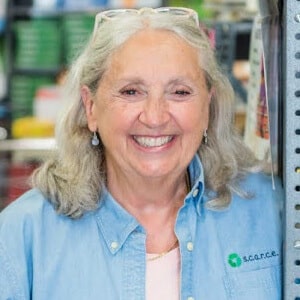 Kay McKeen is the Founder and Executive Director of SCARCE, a nonprofit organization dedicated to providing environmental education and promoting sustainability in communities through recycling and composting initiatives. Since its inception in 1990, SCARCE has reached over 2.3 million people, helping educate and inspire action in 112 countries while spearheading significant legislative changes for environmental protection. Kay’s passion for environmentalism was influenced by her upbringing, nature-loving family members, and her hands-on experience in nursing homes where resource conservation was necessary.
Kay McKeen is the Founder and Executive Director of SCARCE, a nonprofit organization dedicated to providing environmental education and promoting sustainability in communities through recycling and composting initiatives. Since its inception in 1990, SCARCE has reached over 2.3 million people, helping educate and inspire action in 112 countries while spearheading significant legislative changes for environmental protection. Kay’s passion for environmentalism was influenced by her upbringing, nature-loving family members, and her hands-on experience in nursing homes where resource conservation was necessary.
Here’s a glimpse of what you’ll learn:
- [1:57] Kay McKeen discusses how her family values and career led to environmental advocacy and SCARCE
- [5:12] SCARCE’s unique approach to rescuing resources and promoting reuse before recycling
- [6:10] The funding and core educational programs that SCARCE offers to the community
- [7:39] What’s the collaborative approach SCARCE takes with DuPage County to promote sustainability?
- [11:47] How SCARCE’s rescue program gives new life to resources and helps those in need
- [22:22] Kay talks about SCARCE’s biggest challenge and the organization’s determination to find and fulfill needs
- [29:16] SCARCE’s global reach and Kay’s dedication to expanding the nonprofit’s network
In this episode…
In a world increasingly burdened by waste, the fate of discarded items raises compelling questions about value and sustainability. What if the items deemed as trash by one person could transform into essential resources for another, fostering a circular economy? Can small positive actions by individuals lead to large-scale environmental and social benefits?
Kay McKeen, an experienced nonprofit leader, is the embodiment of how one can make a significant impact through networking, creative thinking, and sustainable actions. She shares how her organization has transformed the concept of waste by rescuing and redirecting resources like books, musical instruments, and even laboratory equipment to those in need. From educating communities on environmental issues and fostering green practices to inspiring global initiatives, her mission transcends local boundaries, promoting the welfare of both people and the planet. Together with her organization, Kay has touched the lives of over 2.3 million individuals and operates under the belief that every positive action contributes to a greater collective good.
In this episode of the Mission Matters Podcast, Paul Feith interviews Kay McKeen, Founder and Executive Director of SCARCE, about environmental education and resource rescue. Kay discusses how her family values and career led her to environmental advocacy and SCARCE, the nonprofit’s unique approach to rescuing resources and promoting reuse before recycling, how its rescue program gives new life to resources and helps those in need, and how SCARCE overcomes operational challenges.
Resources mentioned in this episode:
- Paul Feith on LinkedIn
- Paul Gregory Media (PGM)
- Kay McKeen on LinkedIn
- SCARCE
- “Jenifer Fabian – People’s Resource Center” on Mission Matters Podcast
- “Molly Beck Dean – WeGo Together for Kids” on Mission Matters Podcast
Quotable Moments:
- “Protecting resources kind of just became who I am.”
- “We call it rescuing of resources, which is kind of a hard word for people to understand, but reusing is way more important than recycling.”
- “People are looking for ways to take action.”
- “We are constantly trying to find out what is needed and how we can help with that.”
- “Little things add up, and together, look what we can get done.”
Action Steps:
- Start small with sustainable practices: Adopting simple, everyday habits like turning off unused appliances or opting for energy-efficient bulbs are effective because they reduce energy consumption and environmental impact, aligning with the broader mission of building sustainable communities.
- Engage in resource rescue activities: Participating in initiatives like collecting and donating unused items addresses the challenge of resource waste while providing essential items to those in need, fostering community support and sustainability.
- Volunteer for local environmental programs: This step is effective as it not only contributes to local efforts in sustainability but also helps individuals build skills and networks in the environmental sector.
- Educate yourself and others on environmental impact: By understanding the environmental impact of waste, individuals can make informed decisions and inspire others to adopt eco-friendly practices.
- Support legislation and policies for environmental protection: This action is effective as it addresses systemic challenges by helping to create a supportive framework for sustainable practices on a larger scale.
Sponsor for this episode…
Today’s episode is sponsored by Paul Gregory Media, an 18-year-old digital marketing agency in downtown Naperville, Illinois.
They are one of the few thousand Certified B Corporations worldwide, demonstrating PGM as a leader of a global movement to use business as a force for good, meeting high standards of accountability, transparency, and community involvement. They have been trusted by hundreds of organizations since 2006.
PGM is recognized as one of the top marketing agencies in the region, earning more awards than many of its competitors combined. They have the passion, commitment, and expertise to get it done.
To learn more about the services PGM offers or how they can support you with your marketing needs, visit www.paulgregorymedia.com or email them at [email protected].






